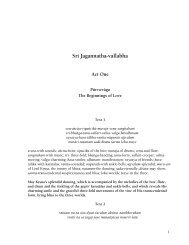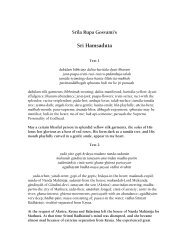Srimad Bhagavatam, Volume 3
Srimad Bhagavatam, Volume 3
Srimad Bhagavatam, Volume 3
You also want an ePaper? Increase the reach of your titles
YUMPU automatically turns print PDFs into web optimized ePapers that Google loves.
<strong>Srimad</strong> Bhagawatam, First Canto, <strong>Volume</strong> Three<br />
The Lord has already performed His duties to help the demigods and the<br />
rest is being awaited by Him. You Pandavas may wait so long as the Lord<br />
is here on this earth.<br />
The Lord descends from His abode (Krishnaloka) the topmest planet in the<br />
spiritual sky inorder to help the demigods administrators of this materialworld<br />
when they are too much vexed by the Ashuras who are not only envious of the<br />
Lord but also of His devotees. As referred to above the conditioned living<br />
beings contact material association by their own choice dictated by a strong<br />
desire to Lord it over the resources of the material world and desire to become<br />
imitation Lord of all they survey; and every one is trying to become an<br />
imitation God, there is keen competition amongst such imitation gods and<br />
such competitors are generally known as Ashuras. When there are too many<br />
Ashurs in the world then it becomes a hell for those who are devotees of the<br />
Lord. Due to the growth of the Ashuras the mass of people who are generally<br />
devoted to the Lord by nature and the pure devotees of the Lord including the<br />
demigods in higher planets pray to the Lord for relief and the Lord either<br />
descends personally from His abode or deputes some of his devotees to<br />
remodel the fallen condition of the human society or even the animal society.<br />
Such disruptions take place not only in the human society but also in the<br />
animal, birds or other living beings including the demigods in the higher<br />
planets. Lord Sri Krishna descended personally on account of vanquishing the<br />
then Ashuras like Kansa, Jarasandha, Sisupala etc., and during the reign of<br />
Maharaja Yudhisthir almost all the above mentioned Ashuras were killed by<br />
the Lord and now he was awaiting the annihilation of His own dynasty called<br />
the Yadubansas who appeared by His will in this world and He wanted to take<br />
them away also before His own departure to His eternal abode. Narada like<br />
Vidura did not disclose the imminent annihilaition of the Yadudynasty but<br />
indirectly gave hint to the King and his brothers to to wait till the incident<br />
happens and the Lord departs.<br />
Dhri;arastra saha bhratra gandharya cha swabharyaya<br />
Dakshinena himabatarishinam ashramam gatah.<br />
Dhritrastra—uncle of Maharaj yudhisthir, Saha—along with, Bhratra—his<br />
brother Vidura, Gandharya—Gandhari also, Cha—and, Swabharyaya—his<br />
own wife, Dakshinena—by the southern side, Himabata—of the Himalyan<br />
mountain. Rishinam—of the Rshis, Ashramam—in shelter, Gatah—he has<br />
gone.<br />
"Oh the King your uncle Dhritarastra along with his brother Vidura and<br />
his own wife Gandhri, has gone to the southern side of the Himalayan<br />
mountains where there are shelters of the great sages"<br />
To pacify the mourning Maharaj Yudhsthira, Narada first of all spoke from<br />
philosophical point of view and then he began to describe the future<br />
movements of his uncle which he could see by his foreseeing power and thus<br />
began to describe as follows.<br />
Srotobhih saptabhir ya bai swardhuni saptadha byadhat<br />
Saptanam pritaye nana saptasrotah prachakshate.<br />
Srotobhih—by currents, Saptabhir—by seven (divisions), Ya—the river,<br />
Bai—certainly, Swardhuni—the sacred Gnages, Saptadha—seven branches<br />
Byadhat—created, Saptanam—of the seven, Pritaye—for satisfaction of,<br />
Nana—various, Saptasrotah—seven sources, Prachakshate—known by the<br />
name.<br />
The place is called as 'Saptasrota' on account of the water of the sacred<br />
Ganges river being furcated in the seven divisions of currents which was<br />
done for the satisfaction of the seven great Rishis.<br />
Snatwa anusavanam tasmin hutwa cha agnin yathavidhi<br />
Abbhakasha upasanta atma saaste vigata esanah.<br />
Snatwa--by taking bath, anusavanam--regularly three times morning noon and<br />
evening, Yasmin--in that sevenly divided Ganges, Hutwa--by performing<br />
sacrifice of the name Agnihotra, Cha--also, Agnin--in the fire, Yathabidhijust<br />
according to the tenets of the scripture, Abbhakasha--allmost fasting by<br />
drinking water, Upasanta--completely controlled, Atma--the gross senses and<br />
the subtle mind, Sa--Dhritarastra, Aste--would be situated, Vigata--devoid of,<br />
Esanah--thoughts in relation with family welfare.<br />
In that 'Saptasrota' bank of the sevenly divided Ganges, Dhritarastra<br />
would now be engaged in the beginning of Astanga Yoga practice by<br />
taking bath three time in the morning, noon and evening and performing<br />
Agnihotra sacrifice in the fire and fasting by drinking water only. This<br />
would help in controlling the mind and the senses being completely freed<br />
from thoughts of family affection.<br />
The Yoga system is a mechanical way of controlling the senses and the mind<br />
for diverting them from matter to spirit. The preliminary processes are the<br />
sitting posture, meditation, spiritual thoughts, utilising the air passing within<br />
the body gradually be situated in trance by facing the Absolute Person<br />
Paramatma. Such mechanical ways of rising up to the spiriturl platform<br />
prescribe some regulative principles of taking bath three times, fasting as far<br />
as possible, sitting with concentration of the mind on spiritual matter and thus<br />
12<br />
gradually becoming free from Vishaya or material objectives. Material<br />
existence means to be absorbed in the material objective which is simply<br />
illusory. The house, country. family, society, children, property, business,<br />
these are some of the material coverings of the spirit Atma and the Yoga<br />
system helps one to be free from all these illusory thoughts of the mind and<br />
gradually turn it towards the Absolute Person Param-Atma. By material<br />
association and education we learn simply to concentrate on such flimsy<br />
things as above mentioned and Yoga means the process of forgetting them<br />
altogether. Modern socalled Yogis and Yoga system manifests some magical<br />
feats and ignorant persons are attracted by such false things or accept the<br />
Yoga system as an art of cheap healing process for diseases of the gross body<br />
But factually the Yoga system is the process of learning to forget what we<br />
have acquired throughout the struggle for existence. Dhritarastra was all along<br />
engaged in the matter of improving the family affairs by raising the standard<br />
of living of his sons or by usurping the property of the Pandavas for the sake<br />
of his own sons. These things are common affairs for a man grossly<br />
materialistic without knowledge of the spiritual force how it can drag one<br />
from heaven to the hell. By the grace of his younger brother Vidura,<br />
Dhritarastra was enlightened in the matter of his grossly illusory engagements<br />
and by such enlightenment only such grossly materially engaged man was<br />
able to leave home for good for spiritual realisation and Sri Naradadeva was<br />
just foretelling the way of his spiritual progress in a place which was<br />
sanctified by the flow of celestial Ganges. Drinking water only without any<br />
solid food is also accounted for as fasting which is very much nece ssary for<br />
advancement of spiritual knowledge. A foolish man want to be cheap Yogi<br />
without observing the regulative principles. A man who has no control over<br />
the tongue at first can hardly become a Yogi. Yogi and Bhogi are two<br />
opposite terms. The Bhogi or the merryman for eating and drinking cannot be<br />
Yogi and Yogi is never allowed to eat and drink unrestrictedly. We may note<br />
with profit how Dhritarastra had began his Yoga system by drinking water<br />
only and sitting calmly in a place of spiritual atmosphere deeply absorbed in<br />
the thoughts of the Lord Hari the Personality of Godhead.<br />
Jeetasana jeetaswasah pratyahrita sada indriyah<br />
Hari bhavanaya dhwasta rajah satwa tamo malah.<br />
Jeetasana—one who has controlled over the sitting posture, Jeetaswasa—one<br />
who has controlled over the breathing process, Pratyahrita—turning back,<br />
Sada—six, Indriyas—senses, Hari—the Absolute Personality of Godhead,<br />
Bhavanaya—absorbed in, Dhwasta—conquered over, Rajah—passion,<br />
Satwa—goodness, Tamo—ignorance, Malah—contaminations.<br />
One who has conquered over the sitting postures (the Yogic Asana) and<br />
thus controlled over the breathing process can turn back the senses<br />
towards the Absolute Perfonality of Godhead and thus become immune<br />
from the contaminations of the modes of material nature namely worldly<br />
goodness, passion and ignorance.<br />
The preliminary activities of the way of yoga is Asana, Pranayama, Pratyahar,<br />
Dhyan, Dharana, etc. So far Maharaj Dhritarastra was concerned he was just<br />
to attain success in those preliminary actions because he was seated tight in a<br />
fixed up sanctified place and was concentrating upon one objective namely<br />
the Supreme personality of Godhead (Hari). As such all his senses were being<br />
engaged in the service of the Lord which process directly helps the devotee to<br />
to get freedom from the contaminations of the three material modes of nature.<br />
Even the highest quality of material mode of goodness is also the cause of<br />
material bondage and what to speak of the other qualities namely passion and<br />
ignorance. Passion and ignorance increase the material propensities of<br />
hankering for material enjoyment and a strong sense of lust for acumulating<br />
wealth and power. One who has conqured over these two base mentalities and<br />
has raised himself on the platform of goodness which is full of knowledge and<br />
morality cannot also control over these senses namely the eyes, the tongue,<br />
the nose, the ear and the touch. But one who has surrendered himself unto the<br />
lotus feet of the Lord Hari, as above mentioned can transcend all influences of<br />
the modes of material nature and be fixed up in the service of the Lord. The<br />
Bhaktiyoga processs therefore directly apply the senses in the loving service<br />
of the Lord which prohibits the performer being engaged in any material<br />
activities. This process of turning back the face of the senses from material<br />
attachment to the loving transcendental service of the Lord is called Pratyahar<br />
and the very process is called Pranayam ultimately ending in the matter of<br />
Samadhi or being absorbed in the objective of pleasing the Supreme Lord<br />
Hari by all means.<br />
Vijnana atmani somyojya kshetrajne pravilapya tam<br />
Brahmani atmanam adhare ghatambararm iva ambare.<br />
Vijnana—purified identity, Atmani—of intelligence, Samyojya—perfectly<br />
fixing up, Kshetrajne—in the matter of the living being, Pravilapya—merging<br />
in, Tam—him, Bramani—in the Supreme, Atmanam—pure living being,<br />
Adhare—in the reservoir, Ghatambaram—sky within the block, Iva—like,<br />
Ambare—in the Supreme sky.<br />
Dhritarastra had to amalgamate his pure identity with intellegence then<br />
merge into the Supreme Being with knowledge of qualitatively one with












